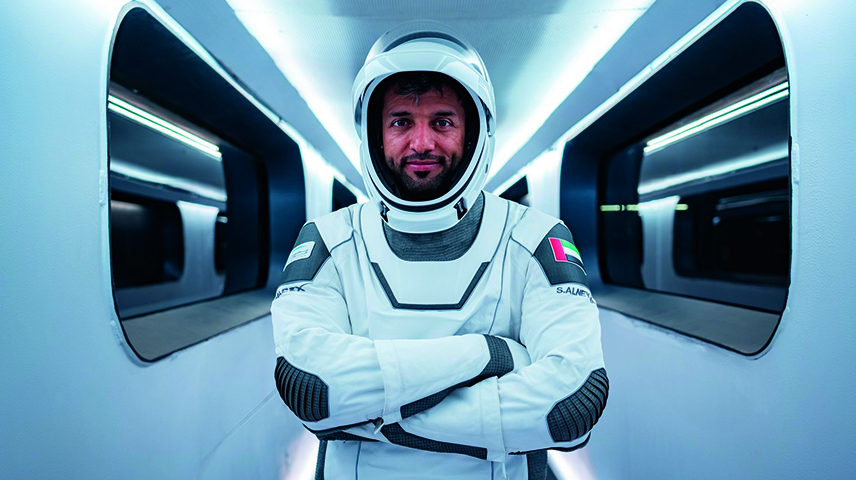Several years after the UAE started its space endeavours and made unprecedented achievements, it has recently launched a new one: Sending an Emirati astronaut to NASA’s Crew 6 mission to the International Space Station. Sultan Al Neyadi will spend six months on the ISS in the most extended Arab space mission in history. He will participate in completing 200 experiments, some of which involve the growth of human cells in space.
The new achievement has many implications that are worth analyzing.
These can be outlined as follows:
1. Far-Sightedness:
Emiratis cherish a photo of the late Sheikh Zayed bin Sultan Al Nahyan with NASA’s Apollo mission in 1974, three years after the UAE was established. The photo is early proof of the late leader’s
far-sightedness. In 2019, the first UAE satellite, Khalifa Sat, was launched into orbit, and one year later, Hazza Al Mansouri became the first Emirati astronaut. Given these achievements, strategists became convinced that the UAE’s political leaders possess a high-level strategic and organizational mindset capable of planning for the decades and even centuries to come.
Additionally, the UAE has established a new tradition in the whole region, presenting a working model for state strategic planning. It became a common belief that it takes positions or pursues a national approach or one that is involved in regional and international affairs after comprehensive and inclusive long-term planning to guarantee success.
2. Leading Change across the Region:
Regarding development plans and the way of thinking about humanitarian issues in the region that went through shifts, the UAE excelled in attracting excellent brains from across the world, including those from Arab countries that contributed to global changes. One of these is Egyptian space scientist Farouk El-Baz who became an advisor to the UAE Space Agency. Other areas in which the UAE is leading change include tolerance and inter-faith dialogue, and co-existence, as well as issues long viewed by outdated and rigid perceptions that shaped a backward stereotype for the region.
This means that the UAE is the leading engineer in changing the image of some regional countries. It alone achieved the new civilized image of these countries and contributed to changing their way of thinking and positions on humanitarian issues, economic development and policies influencing international decisions.
3. Continuous Reinforcement of the Status:
The mission of astronaut Al Neyadi will fuel the desire in Arab countries to enter space exploration. This would remove the idea that Arab countries are backward and lag behind the rest of humanity. The UAE will reap the fruits of its efforts in ending certain countries’ monopolization of knowledge and science.
The historic scientific missions represent an Emirati invitation to other countries to move into a completely new stage in terms of development and future plans and even in terms of competition. This includes the establishment of patriotism as a culture across society and the way governments and states operate. That is because the nature of these missions presents other regional countries with a new reality that requires the development and upgrading of work methods, the way of thinking and approaches to planning.
Moreover, Al Neyadi’s mission is set to further reinforce the UAE’s international status as one of the 11 countries in the world that carried out long-term space missions. The UAE leads Arab countries in the successful development and is likely to retain this status. The current regional competition in development and progress is inspired by the UAE’s experience and technological know-how and developmental leadership, and innovative initiatives.
4. Integration and Specificity:
The region is heading into further interconnection with the rest of the world as opposed to the wave of globalization, causing these counties to lose their cultural specificity. The UAE is credited with joining the new global system of values thanks to the policy of gradual change into the future and interaction with others while also maintaining its specificity so as to spare Emiratis radical and sudden changes that might cause shocks. Such change is likely to be acceptable, viable and realistic.
In addition to the UAE’s launch of the wave of political and developmental change in the region, it will also work, in the next change, to restore the balance between global values and the patriotic values of regional countries, which makes it the first country to go beyond the region’s boundaries of thinking and planning. It is a country taking an interest in maintaining the authentic values of the region which led the world in the past.
In conclusion, the UAE’s achievements are writing a new history for the region. These include the establishment of the country as a federal union, confronting terrorists and extremists who distorted the region’s image, the signing of the historic declaration of fraternity calling for peace between nations and religions, and the launch of peaceful nuclear plants, as well as space exploration alongside other advanced nations. The results of scientific experiments to be conducted by astronaut Al Neyadi on the ISS represent a historic UAE-made addition to the whole region.


